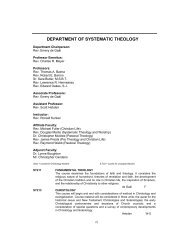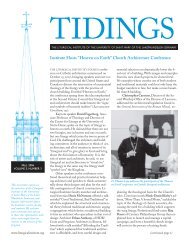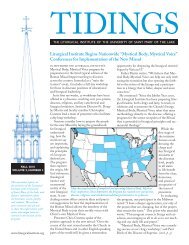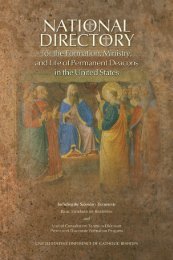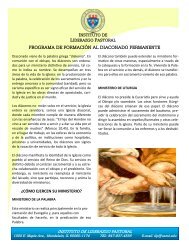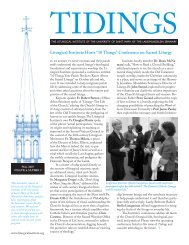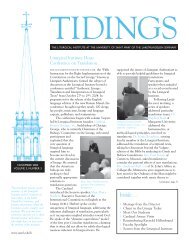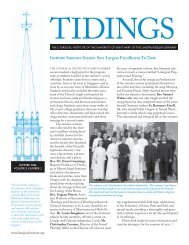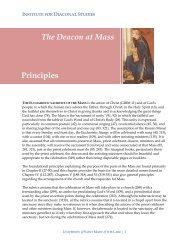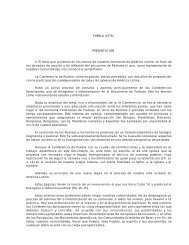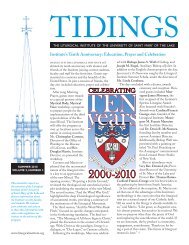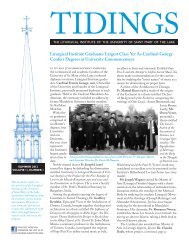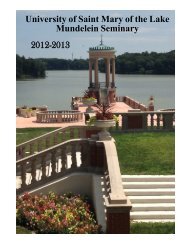Seminary and Graduate School of Theology - Mundelein Seminary
Seminary and Graduate School of Theology - Mundelein Seminary
Seminary and Graduate School of Theology - Mundelein Seminary
Create successful ePaper yourself
Turn your PDF publications into a flip-book with our unique Google optimized e-Paper software.
ate for the Catholic community. Seminarians<br />
develop this important trait by:<br />
1. Studying the development <strong>of</strong> our Church<br />
as a spiritual, social <strong>and</strong> political reality in a<br />
wide variety <strong>of</strong> cultures <strong>and</strong> circumstances.<br />
2. Acquiring a critical knowledge <strong>of</strong> the<br />
history <strong>of</strong> the Catholic tradition.<br />
3. Forming an ability to engage in a critical<br />
reading <strong>of</strong> the classics <strong>of</strong> the Catholic theological<br />
tradition.<br />
4. Learning the interpretation <strong>of</strong> our historical<br />
<strong>and</strong> theological tradition as a creative<br />
resource for contemporary Christian life,<br />
ongoing renewal, <strong>and</strong> continuing cultural<br />
engagement.<br />
WORSHIP<br />
The seminarian:<br />
1. Learns the fundamentals <strong>of</strong> liturgy.<br />
2. Acquires an ability to lead the assembly<br />
well <strong>and</strong> to preside prayerfully.<br />
3. Fosters a deep love for the liturgy <strong>and</strong><br />
an appreciation <strong>of</strong> the Church’s rites.<br />
4. Is able to implement in parish life the<br />
liturgical principles <strong>of</strong> the Catholic Church<br />
learned at the University <strong>of</strong> Saint Mary <strong>of</strong><br />
the Lake/<strong>Mundelein</strong> <strong>Seminary</strong>.<br />
5. Gains the ability to make liturgical decisions<br />
based on good theology with the exercise<br />
<strong>of</strong> the Christian virtues.<br />
6. Integrates ministerial engagement with<br />
liturgical expression.<br />
PASTORAL THEOLOGY<br />
The seminarian:<br />
1. Underst<strong>and</strong>s the dimensions <strong>of</strong> pastoral<br />
situations – individual <strong>and</strong> group – <strong>and</strong> ministers<br />
appropriately.<br />
2. Listens, responds, moves to appropriate<br />
action in working with people.<br />
3. Brings the Tradition to bear in pastoral<br />
situations in word, action, guiding background<br />
<strong>and</strong> self evaluation, growing in sensitivity<br />
to the movement <strong>of</strong> God in life situations.<br />
4. Needs to know that what is being said is<br />
important in achieving this objective.<br />
5. Underst<strong>and</strong>s the theological implications<br />
<strong>of</strong> his ministerial words <strong>and</strong> actions.<br />
6. Underst<strong>and</strong>s <strong>and</strong> ministers with the cultural<br />
dimensions <strong>of</strong> situations in mind.<br />
7. Has a particular Catholic underst<strong>and</strong>ing<br />
<strong>of</strong> marriage, family, grief, death, bereavement,<br />
<strong>and</strong> hospital ministry.<br />
8. Underst<strong>and</strong>s <strong>and</strong> negotiates resolution <strong>of</strong><br />
conflict.<br />
9. Has a framework <strong>and</strong> theological vision for<br />
parish leadership, administration, supervision,<br />
<strong>and</strong> planning.<br />
10. Underst<strong>and</strong>s <strong>and</strong> acts according to ministerial<br />
ethical guidelines.<br />
11. Underst<strong>and</strong>s his ministerial strengths <strong>and</strong><br />
limits.<br />
ESL<br />
Overall Objective: To build positive relationships<br />
with English speakers among classmates,<br />
parishioners, faculty <strong>and</strong> staff, <strong>and</strong> ministry personnel<br />
through clear, confident <strong>and</strong> accurate<br />
communication.<br />
1. To know English so that one can achieve<br />
the objectives <strong>of</strong> the Master <strong>of</strong> Divinity program.<br />
2. To be able to underst<strong>and</strong> <strong>and</strong> use the target<br />
language effectively.<br />
3. To be competent in proclaiming the Word<br />
<strong>of</strong> God <strong>and</strong> leading prayer.<br />
4. To acculturate to the USA customs <strong>and</strong><br />
way <strong>of</strong> life.<br />
5. To be open to <strong>and</strong> engaged with individuals<br />
from diverse cultures <strong>and</strong> backgrounds.<br />
6. To gain knowledge in how to access <strong>and</strong><br />
use language resources for lifelong learning.<br />
MASTER OF DIVINITY REQUIREMENTS<br />
(158 quarter hours)<br />
A. Biblical Exegesis <strong>and</strong> Proclamation<br />
Pentateuch (Th. I)<br />
Johannine Literature<br />
(Th. II)<br />
Pauline Literature (Th. I)<br />
Homiletics I<br />
(Th. II)<br />
Narrative Approaches to Biblical<br />
Preaching<br />
(Th. III)<br />
Synoptic Gospel<br />
2nd Synoptic Elective (Provisional) or<br />
Pauline Elective - 2/3hrs.<br />
Prophets Elective<br />
Wisdom/Psalms Elective - 2 hrs.<br />
Scripture Elective<br />
Homiletics Elective OR Vocal Practicum<br />
B. Systematic <strong>Theology</strong><br />
Underst<strong>and</strong>ing the Ministerial<br />
Priesthood - 1 hr. (Th. I)<br />
Fundamental <strong>Theology</strong> (Th. I)<br />
Christology (Th. I)<br />
Doctrine <strong>of</strong> God (Th. I)<br />
Christian Anthropology (Th. I)<br />
Ecclesiology<br />
(Th. II)<br />
Sacraments <strong>of</strong> Initiation<br />
(Th. II)<br />
Sac. <strong>of</strong> Healing <strong>and</strong> Vocation (Th. II)<br />
54



